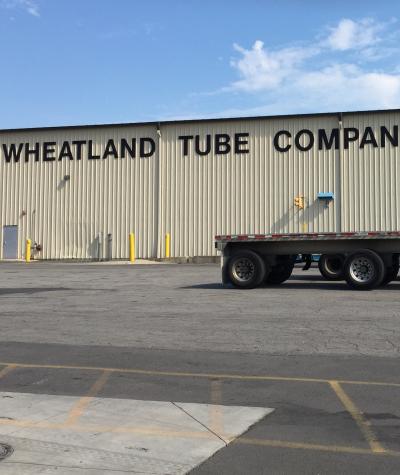For more than two years, billionaire Barry Zekelman has been working to pull levers of influence in Trump’s Washington. The Canadian CEO of steel-tube manufacturer Zekelman Industries, Zekelman has a significant stake in the Trump administration’s policies on steel imports—and he and his company have spent millions of dollars to advance those interests.
From lobbying to meeting with top administration officials to making political contributions, new reporting by the New York Times detailed the extent of this years-long “case study in how to gain and employ access in Mr. Trump’s Washington.” It also revealed at least two ways in which legal lines were crossed.
First, just a week and a half after President Trump’s inauguration, Zekelman and his company’s lobbyist arranged a meeting with Stephen Vaughn, who at the time was the acting U.S. trade representative—and who had previously counted Zekelman Industries as a client.
This meeting appears to have violated ethics rules barring Vaughn from holding closed-door official meetings with a former client or employer (the Zekelman Industries lobbyist who arranged the meeting was also from King & Spalding, Vaughn’s old firm.) The trade representative’s office downplayed it as “a brief personal meeting,” yet Zekelman made clear to the Times that the meeting pertained to official business: He said he stressed to Vaughn during the visit that “[i]mports are a real issue, hurting the industry and they have got to be dealt with.”
CLC filed a complaint with the Office of Government Ethics based on the Times’s report, because the public should not be left to wonder whether Vaughn was acting in the interests of the American public or the interests of his former employer, whose client had a clear and direct interest in the trade policies on which Vaughn was working.
Second, from April through October 2018, a Zekelman Industries subsidiary made $1.75 million in contributions to the pro-Trump super PAC America First Action, which the Trump campaign has publicly blessed as the “approved outside non-campaign group” supporting the President.
Shortly before the first contribution, the administration imposed a 25% import tariff, leading to a surge in sales at Zekelman’s U.S. plants; shortly after that contribution, Zekelman met with Trump at the Trump International Hotel in Washington, D.C., and the administration imposed caps on steel imports from Zekelman competitors, like South Korea.
What made those corporate contributions illegal is that Zekelman, a Canadian national, admitted that he participated in the decision to make them:
Mr. Zekelman, who does not have United States citizenship, said in an interview that he did not play a role in the decision to donate. But he added that he did discuss the matter with other company executives, after a representative from America First Action approached one of Zekelman Industries’ lawyers and asked for a contribution.
“They contacted our people, our people brought it to me,” Mr. Zekelman said. “I said, great, I would love to find a way to support him.”
Foreign nationals are prohibited from directly or indirectly making a federal political contribution—and “shall not direct, dictate, control, or directly or indirectly participate in the decision-making process.” Zekelman’s participation in the decision is what rendered the corporate contributions unlawful.
Citing this evidence, CLC filed a complaint with the Federal Election Commission (FEC) alleging that Zekelman, Zekelman Industries, and the subsidiary, Wheatland Tube, LLC, violated the law.
Although it frequently fails to muster enough votes to penalize violators of campaign finance law, the FEC recently has signaled a willingness to enforce the law when foreign national ban violations are brought to its attention.
Earlier this year, the FEC levied record-breaking fines in a strikingly similar case from the 2016 election cycle. The foreign national owner of a corporation called American Pacific International Capital (APIC) admitted to an Intercept reporter that he had participated in the corporation’s $1.3 million in contributions to the super PAC supporting Jeb Bush’s candidacy.
In both the APIC and the Wheatland Tube cases, the apparent violations came to light as a result of diligent reporting and on-the-record admissions by the involved parties. Typically, the public has no idea how decisions about political contributions from foreign-owned corporations are actually made. If the contribution had been made to a dark money group rather than a super PAC, the public may have never known that the contribution happened in the first place.
Thanks to the Supreme Court’s decision in Citizens United and the failures of Congress to strengthen the foreign national ban, disclosure rules, and other provisions of campaign finance law, Zekelman’s company may have gotten away with its $1.75 million in contributions to America First Action had they not attracted media scrutiny. But when clear violations like this one do come to light, it is critical that the FEC enforce the law.
***
By all appearances, these efforts“proved highly successful in encouraging actions that have benefited Mr. Zekelman’s company’s bottom line and his American employees”—for example:
The administration has ruled in favor of Zekelman Industries on a series of claims the company has made against foreign competitors. Sales and profits have surged at the privately held company, which has annual revenues of nearly $3 billion. Employment at the company’s 14 plants in the United States — in Illinois, Pennsylvania, California, Ohio and other states, which operate under names including Wheatland Tube, Sharon Tube and Atlas Tube — has increased by 600, and he hopes to add another 500 jobs this year.
“In the 33 years I have been in business, I have never been more encouraged,” said Mr. Zekelman, who took over the business at 19, when his father died.
Read CLC’s FEC complaint about the foreign national ban violations here. Read the Times’s subsequent coverage of that complaint here.
Read CLC’s OGE complaint about the Vaughn-Zekelman meeting here.
